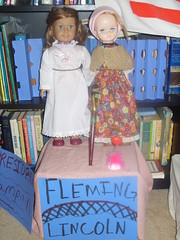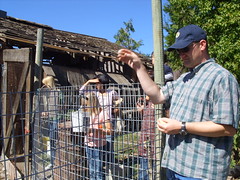You can find the first two progress report posts
here.
Mariel has decided that finishing her school year by June is a good goal to have, and I saw an increase in her diligence the first five weeks of school. (She has enjoyed our recent break immensely, too!) Here is what she has accomplished so far:
*Citizenship: She explored
Ben's Guide to Government online just as a free activity. We have also had discussions on government, politics and the election process. Her current opinion on that subject is: "Presidential election? Debates? Bah, humbug!"
*Geography: Mariel has read and narrated the first nine chapters of Halliburton's Book of Marvels (The Occident), which includes famous sites in California: Yosemite National Park, the Bay Bridge and Golden Gate Bridge. Mariel made sure that we drove across both bridges during our recent trip to CA. (We went to Yosemite a few years ago and just couldn't make it that far inland this trip.)

(The fambly eating a picnic lunch next to the Golden Gate Bridge.)
She also read and narrated chapters on the Grand Canyon in Arizona, Boulder Dam, Niagara Falls, New York City, Washington, D.C. and Fort Jefferson. For mapwork she has traced a map of the United States and pinpointed the location of each site, as well as the locations of our loved ones' homes and the Colorado, Columbia, Mississippi and Missouri Rivers. I also had her trace another map of the U.S. and chart the journey of Lewis and Clark, since we are reading Of Courage Undaunted for history this year. And she did a busyworksheet of questions on the Louisiana Purchase.
I had intended to have the kids color in maps I printed off the Internet, but we didn't have printer ink for the longest time, and as a result I had them trace maps instead, and they did such a good job. I don't think my expectations of them were high enough. I had thought it would take too long to do it that way, but she and Triss can trace maps fairly quickly, and they look
nice!
*History: Her history spine for the year is Abraham Lincoln's World, with This Country of Ours as dedicated American history. Important events covered thus far include: the war of 1812, the Lewis and Clark expedition, the campaigns of Napoleon, and the fight for independence in Venezuela. It has been slow going in these two books, partly because she is doing a written narration for each reading. She has also updated her book of time with the events and people she has come in contact with in her readings and artist/composer study.
In addition to the two main books, she is reading and narrating (aloud) Of Courage Undaunted, a book about the Lewis and Clark expedition.
*Language Arts: Mariel is working through the Winston Basic Grammar book and enjoying it. She especially likes setting the cards in order before she writes the symbols above the sentences in the workbook. She has gone through articles, nouns and pronouns so far, and is doing very well. She does copywork two days per week and works in her cursive italic penmanship book two days per week. She has studied dictation once per week, which helps her with spelling, and I also have her use CM method to visualize and memorize the spellings of words she misspells in other work. I don't do this on all of her work. For instance, her written narrations are typed on the computer using spell-check. It's only if I happen to notice she has spelled something wrong that I toss that word in next time we are doing dictation. We use
Spelling Wisdom for studied dictation, so I know that eventually she will study all 6,000 most frequently used words.
She did a writing assignment for me in September-- she wrote some limericks a la Edward Lear. She is going to turn in a mini-report on our trip to California at the end of this month as well. She and I are working on the dreaded elementary school report also, which will be due at the end of February. She chose her topic already--the
Library of Alexandria.
Foreign Language: I had her do a few more word roots from Grammar Songs at the beginning of the school year, but what I really want to do is re-purchase English from the Roots Up and have her work on that for the rest of the year. Or maybe Rummy Roots would be better. I plan for her and Cornflower to begin a regular Latin program next fall, when Cornflower has another year under her belt. Then I will be able to teach them both at the same time.
I haven't taken the time to set our computer up to work with the new Spanish program offered for free through our library's website, so Mariel hasn't done any Spanish yet this year. (Javamom is doing a dedicated Spanish I program with Triss on the days I teach her son piano, so Mariel and Cornflower will only get the Spanish that *I* provide this year.)
*Literature: Triss, Mariel and I are reading through Love's Labours Lost this term. We haven't started any Plutarch, and I think we might be doing Shakespeare then Plutarch this year. I just can't fit both in, I don't think. Mariel hasn't ever done any Plutarch, so it will be an adventure. Love's Labours Lost is a short play, so we might even get to start Plutarch before the end of the term.
We are reading through King Arthur and His Knights by Howard Pyle together, and greatly enjoying it. This is a free reading, no narration. She is reading and doing a list-type narration for Age of Fable this year-- reading the section, then heading the narration with the name of the myth and giving bullet points for each piece of literature Bulfinch references for the myth. This is still kind of tricky for her, so sometimes I assist.
*Math: She has drilled and drilled (and drilled) her 7-times and 4-times tables these first few weeks, and I think she's got them. She also studied time ("Lou gets up at 6:45 AM. School starts at 8:15 AM. How many minutes is it until school begins?"), the calendar ("Jimmy Carter's birthday is Oct. 1. James Polk's birthday is 32 days later."), measurement and division. She is working through the Scott Foresman Exploring Mathematics fourth grade text.
*Memory Work/Poetry: She has been working on memorizing a Rudyard Kipling poem, as well as the ten major US wars (Revolution, War of 1812, Mexican-American War, Civil War, Spanish-American War, World War I, World War II, Korean War, Vietnam War, Persian Gulf War) and their dates. I just realized the War on Terrorism is not in the list. I'll have to add that in. She also reviewed the countries of Western Europe the first two weeks of the term. I really need to make the girls each their own
memory binder a la Simply Charlotte Mason. That is one of my goals for term 2.
*Music: She is still taking violin, and has been studying a piece that seems to be a jump in difficulty for her. The goal is to play it in the November recital. She is also working on piano-- I got her a book of etudes to work through this year, and
the first book of the Festival Collection (I found this set of books this summer and really like it because it has real pieces by real composers in the four major eras of music). She is also working through a new theory book.
Science: She is reading, narrating and copying the diagrams out of Christian Liberty Nature Reader 5. So far she has learned about blood, the stomach, breathing, the brain and nerves, the teeth, the eye and the ear. She is also reading Wild Animals I Have Known and has finished the story of the wolf (Lobo). We are reading through Fairyland of Science together. So far we have learned about the size of the sun (and how bright, how hot and how far away it is) and the earth, and a little about the scientific errors of the Victorian era and the truth about how light travels. (Although the book is a little dated, I find the way we are invited to enjoy and be fascinated by science invaluable. Mariel is not a science-oriented child, and the introduction in this book has finally convinced her that there really is something wonderful about science. I read ahead in order not to confuse Mariel with the dated bits.) Mariel is reading Physics Lab in a Housewares Store also, and doing the experiments. And we are working through Swimming Creatures of the Fifth Day (she and Cornflower studied some basics of oceanography at first, and are currently learning about whales). And I am teaching her to keep a lab notebook.
This is a lot of science! I am trying to figure out what to let go of, or at least to treat as free reading. So far, Mariel doesn't seem to object, though, except to the notebook part, which is not negotiable. :O)


































